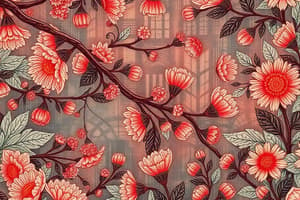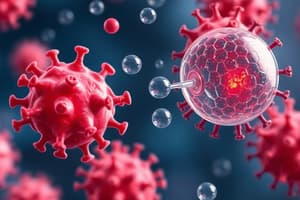Podcast
Questions and Answers
What characterizes chronic inflammation compared to acute inflammation?
What characterizes chronic inflammation compared to acute inflammation?
- It may last for weeks, months, or years. (correct)
- It lasts for a shorter duration of time.
- It never leads to scarring or deformity.
- It primarily involves neutrophils at the site of injury.
Which cells are primarily involved in nonspecific chronic inflammation?
Which cells are primarily involved in nonspecific chronic inflammation?
- Macrophages and lymphocytes (correct)
- Neutrophils and lymphocytes
- Eosinophils and basophils
- Platelets and fibroblasts
What is a granuloma?
What is a granuloma?
- An inflammation that only occurs in the lungs.
- A lesion consisting of macrophages surrounded by lymphocytes. (correct)
- A type of bacterial infection.
- A type of acute inflammatory response.
Which of the following can lead to granulomatous inflammation?
Which of the following can lead to granulomatous inflammation?
What can chronic inflammation lead to if prolonged?
What can chronic inflammation lead to if prolonged?
What is the primary function of histamine in the inflammatory response?
What is the primary function of histamine in the inflammatory response?
What role does bradykinin play in the inflammatory response?
What role does bradykinin play in the inflammatory response?
Which exudate is typically associated with mild inflammation?
Which exudate is typically associated with mild inflammation?
Which of the following substances is responsible for the pain often associated with inflammation?
Which of the following substances is responsible for the pain often associated with inflammation?
What is a significant role of leukotrienes in the inflammatory process?
What is a significant role of leukotrienes in the inflammatory process?
What is the main effect of glucocorticoids on inflammatory mediators?
What is the main effect of glucocorticoids on inflammatory mediators?
Platelet-Activating Factor is primarily responsible for which of the following?
Platelet-Activating Factor is primarily responsible for which of the following?
What type of exudate indicates severe tissue damage with the leakage of red blood cells from capillaries?
What type of exudate indicates severe tissue damage with the leakage of red blood cells from capillaries?
Which class of proteins aids in the direct killing of microorganisms during the inflammatory response?
Which class of proteins aids in the direct killing of microorganisms during the inflammatory response?
What is a characteristic feature of acute inflammation?
What is a characteristic feature of acute inflammation?
Flashcards
Chronic Inflammation
Chronic Inflammation
A type of inflammation that can last for weeks, months, or even years.
Macrophages and Lymphocytes
Macrophages and Lymphocytes
Cells that persist at the site of inflammation for extended periods and contribute to tissue remodeling.
Fibroblast Proliferation
Fibroblast Proliferation
The process of forming new connective tissue, which can lead to scarring and tissue deformation.
Granulomatous Inflammation
Granulomatous Inflammation
Signup and view all the flashcards
Tubercle
Tubercle
Signup and view all the flashcards
What are inflammatory mediators?
What are inflammatory mediators?
Signup and view all the flashcards
What is histamine's role in inflammation?
What is histamine's role in inflammation?
Signup and view all the flashcards
What are prostaglandins?
What are prostaglandins?
Signup and view all the flashcards
How do plasma proteins take part in inflammation?
How do plasma proteins take part in inflammation?
Signup and view all the flashcards
What is the role of the clotting system in inflammation?
What is the role of the clotting system in inflammation?
Signup and view all the flashcards
What are leukotrienes?
What are leukotrienes?
Signup and view all the flashcards
What are platelet-activating factors?
What are platelet-activating factors?
Signup and view all the flashcards
What are cytokines?
What are cytokines?
Signup and view all the flashcards
What is acute inflammation?
What is acute inflammation?
Signup and view all the flashcards
What are exudates?
What are exudates?
Signup and view all the flashcards
Study Notes
Chemical Mediators in Inflammation
- Chemical mediators are substances that initiate and regulate the inflammatory response.
- Histamine is found in granules of platelets, basophils, and mast cells. It causes vasodilation (widening of blood vessels) and increased permeability of capillaries, a key early step in inflammation.
Prostaglandins
- Prostaglandins are lipid-soluble molecules derived from arachidonic acid. They are found in various foods like poultry, meat, fish, and eggs.
- They contribute to vasodilation, increased capillary permeability, pain, and fever.
- Aspirin inhibits prostaglandin production, reducing inflammation.
- Glucocorticoids decrease arachidonic acid availability, also reducing prostaglandin production.
Plasma Proteins
- Plasma proteins include kinins, activated complement proteins, and clotting factors.
- Bradykinin dilates blood vessels, increases capillary permeability, and causes pain.
- The complement system is a group of proteins that work together in the inflammatory response, including killing microorganisms directly.
Clotting System
- The clotting system forms a fibrinous meshwork at the inflamed site.
- This traps exudates, microorganisms, and foreign bodies.
- This prevents the spread of infection and inflammation to adjacent tissues, and keeps microorganisms close to phagocytes.
- It forms a clot, stopping bleeding and providing structure for future repair.
Leukotrienes
- Leukotrienes are produced from arachidonic acid in leukocytes and mast cells.
- They promote leukocyte margination and chemotaxis (movement of cells).
- Some leukotrienes cause vasodilation.
Platelet-Activating Factor
- Platelet-activating factor induces platelet aggregation (sticking together) during clotting.
- It activates neutrophils and provides chemotactic signals to eosinophils.
Cytokines
- Cytokines are produced by numerous cells like lymphocytes, macrophages, and others.
- Interleukins (some are pyrogens) are a type of cytokine.
- Interferons interfere with viruses infecting nearby cells, and other cytokines have related functions.
Acute Inflammation
- Acute inflammation has a rapid onset with minimal damage and rapid resolution.
- Exudates, of diverse types, are formed.
- Serous exudate: watery, low protein.
- Hemorrhagic exudate: bloody, high protein, due to leakage of red blood cells.
- Fibrinous exudate: thick, sticky, meshwork from fibrinogen.
- Purulent exudate: pus, degraded white blood cells, proteins, and cellular debris.
Chronic Inflammation
- Chronic inflammation may last for weeks, months, or years.
- It may arise from recurrent acute inflammation or low-grade responses.
- Macrophages and lymphocytes replace neutrophils.
- Fibroblast proliferation causes scarring and tissue distortion.
- Chronic inflammation can result from exposure to various substances such as talc, asbestos, silica, surgical sutures and microorganisms.
- Nonspecific and Granulomatous are two types of chronic inflammation.
Chronic Inflammation: Granulomatous Lesion
- A granuloma is a small (1-2mm) lesion.
- Macrophage infiltration, surrounded by lymphocytes, is a hallmark feature.
- Granulomas result from contact with substances like sutures, splinters, silica, asbestos, and microorganisms causing tuberculosis or syphilis.
- These substances are hard to digest.
- The immune response forms a mass of macrophages (epithelioid cells) around the foreign material, encapsulated by connective tissue.
- A tubercle is a granuloma associated with Mycobacterium tuberculosis infection.
Studying That Suits You
Use AI to generate personalized quizzes and flashcards to suit your learning preferences.




